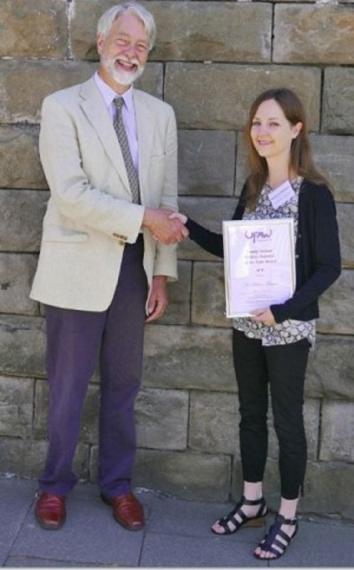2018 Award - UFAW Young Animal Welfare Scientist of the Year

2018 Award Winner
UFAW Young Animal Welfare Scientist of the Year
Dr Rebecca Meagher, a Lecturer in Dairy Animal Science at the University of Reading has been awarded the Universities Federation for Animal Welfare (UFAW) Young Animal Welfare Scientist of the Year Award in recognition of her exceptional contribution to the field of animal welfare.
Dr Meagher was nominated for the award by her former PhD and post-doctoral advisor Professor Georgia Mason, who said: “Becky is scholarly, thoughtful, innovative, productive and likely to play a leading role in the future of animal welfare science.”
Dr Meagher has 22 publications, and a lectureship in animal welfare, despite being only 6 years post-doctoral. She has worked in two of the largest welfare science groups in North America (Guelph and University of British Columbia), becoming expert at experimental design and statistics, and knowledgeable about welfare issues in diverse species, especially agricultural. She has taught welfare science to undergraduates and graduate students, including developing new courses and using innovative educational techniques.
In 2012 she lead-authored the first ever empirical demonstration of boredom-like states in animals in barren housing conditions (published in Plos One). This attracted considerable attention from the science media, and has since been accessed over 10,000 times.
Her PhD tackled an unusual theme: why are captive animals often so inactive, and does it matter? To address this she carefully developed and validated indicators of the states of fear, depression, apathy and boredom in the mink. Becky’s subsequent work on simple enrichments for farmed mink helped change animal care codes in Canada (so improving the housing of millions of these animals each year). She also worked on the reliability of tests on dairy calves of their fear of humans and of novelty and investigated whether heifers are motivated to obtain cognitive stimulation. Her other major research achievement is to show that isolating young calves impairs their abilities to learn, again work that attracted high level media attention.
Dr Meagher’s research to date, be it on cattle, mink, mice or parrots, has had its heart two broad, deep and critical questions that are relevant to almost every species we keep. First, how can we tell, objectively, what animals are feeling? Can we broadly identify negative affect, and if we take a modular view of affective states, can we operationalise fear, boredom and depression? And second, why don’t satisfactory food, water, health and thermal comfort suffice to guarantee good welfare?
Amongst the letters of recommendation which accompanied her nomination was one from Professor Daniel Weary from the University of British Columbia, Canada who said: “Becky is an exceptionally strong thinker and scholar. Her work to date demonstrates her ability to make progress on complex and important problems that address important welfare concerns … I enthusiastically support her nomination for the UFAW Young Animal Welfare Scientist of the Year award.”
Dr Meagher was presented with her award at UFAW’s 2018 one day conference which was held at the Centre for Life, Newcastle, on the 28th of June. She said: “I’m very honoured to receive this award from UFAW, and grateful to my former supervisor, Prof Georgia Mason, for both the nomination and her mentorship. I have been very lucky in my early career to be able to work with excellent scientists in supportive environments.”
Dr Robert Hubrecht, UFAW’s Chief Executive who presented the award said: “Dr Meagher’s research has addressed very challenging animal welfare science issues, including individual differences that may affect animals’ housing requirements and inferences about animals’ mental states. Her work shows considerable promise for an outstanding career in animal welfare science and she is a very worthy recipient of this award.”
Please click on the following link to go directly to the website: https://www.ufaw.org.uk/